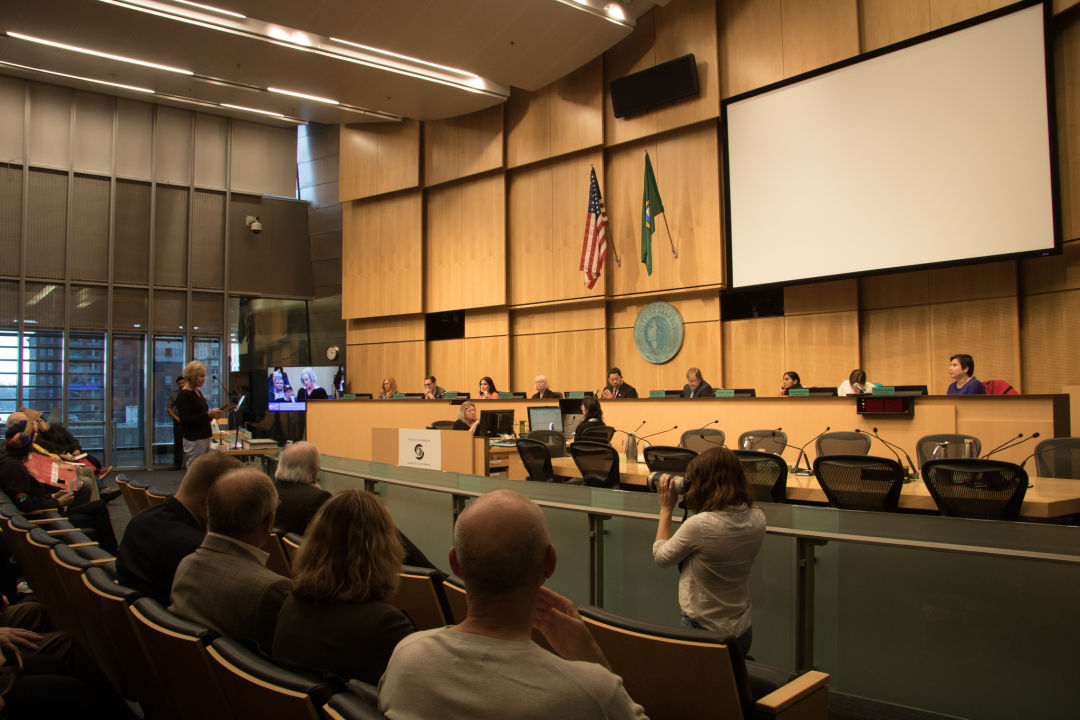Who Is Running for Seattle City Council?

Image: Seattle City Council
While the 2019 general election is still a year away, competitive Seattle City Council candidates have already begun announcing their runs against sitting council members. And with seven of the nine council seats on the ballot, news will move fast.
Only two at-large, citywide positions on the council won't be up for re-election. (Lorena Gonzalez and Teresa Mosqueda won their at-large seats last year.) The rest of the council seats are determined by district, with Seattle divided up into seven geographic parts.
Every council member has a challenger so far, some more serious than others. Here's how the races are shaping up.
Races to Watch: Open Seats in Districts 4 and 7
District 4, Northeast Seattle (includes Eastlake, Wallingford, and University District)
Two council members have announced that they won't be running for re-election.
Rob Johnson, who took the helm of the zoning committee and Mandatory Housing Affordability plan, will step down after just one term on the council.
Hoping to carry the torch is Shaun Scott—a Democratic Socialists of America organizer and writer who worked for U.S. representative Pramila Jayapal—who launched his campaign after Thanksgiving. A staunch advocate for the homeless, Scott said he wants the city to use its bonding capacity for affordable housing, tax vacant dwellings, and reform the city's zoning policies to increase density in all single-family neighborhoods.
Scott is one of just two council candidates out of the 11 interviewed who told PubliCola he supported the city council's head tax before it was repealed. The other: Ethan Hunter, a Seattle Central Community College student, who's also running for this seat at the age of 19.
Like Scott, Hunter is hoping to attract the student vote and said his platform will largely focus on education. He said he's a recipient of the city's free college tuition program, which was expanded to include all Seattle public high school students under mayor Jenny Durkan. He also plans to include a revised head tax in his platform, but declined to offer details on what that will look like.
Alex Pedersen, once a legislative aide to ex-mayor Tim Burgess when he was a council member, is also running in District 4 on a back-to-basics platform and said he'd bring accountability back to the council. Though he has a background in the private sector, he said he won't accept donations from corporations or corporate political action committees.
Scott and Pedersen both said they'll participate in the city's democracy vouchers program.
District 7, Downtown Seattle (includes Pioneer Square and Magnolia)
Sally Bagshaw, a veteran council member first elected in 2009, is the second to announce she won't run for re-election. Three candidates have filed to run for her seat so far.
Andrew Lewis—assistant city attorney under Pete Holmes, former deputy prosecuting attorney for King County—campaigned for former council member Nick Licata and council member Lisa Herbold in 2015.
But while he's connected to two of the historically strongest advocates for a head tax, Lewis said he didn't support it and parroted Bagshaw by calling for a more regional approach to funding for homelessness. He said he wants to focus on accountability and is calling for performance auditing for the city.
"I think that we need to focus as a city on engaging business and labor as civic partners instead of just fountains of potential revenue or targets for regulation," he told PubliCola. "I do think that we need to be in a position where we can be building strong relationships instead of engaging in these kinds of divisive fights."
Similarly, former FBI operative Naveed Jamali, who's also running in District 7, said voters want stability and predictability from their council members. He said he believes "we have a lot of money coming in, and it's a question of how we're spending it."
Neighborhood and anti-growth activist Elizabeth Campbell filed as a candidate while also starting a campaign for a 2019 initiative to repeal the city's soda tax. She said she would've supported the head tax had it been at a lower rate and applied to all companies, including small businesses. She said City Hall needs "different representation and different personalities."
Races to Watch: Vulnerable Seats
Debora Juarez and Lisa Herbold are two council members who during the last budget cycle focused primarily on district wins.
They also appear to be the safest in their seats—only Alex Tsimerman, who runs for elected office every year and is most well-known for his Nazi salutes at council meetings, filed to run against Juarez in District 5 so far.
Herbold in District 1 (West Seattle) is facing Phillip Tavel, a criminal defense lawyer who also ran against her in 2015 and didn't make it through the primary. But Tavel said he thinks he's better known in the district now, and that voters feel the need for a change this time around.
That leaves Bruce Harrell, Kshama Sawant, and Mike O'Brien potentially facing tough races as incumbents if they want to stay on the council.
District 3, Central Seattle (includes Capitol Hill)
Beto Yarce is a gay Mexican American small businessman and community organizer who is challenging socialist Sawant.
While Sawant's most notable for her activism for communities of color and ability to rally a crowd, Yarce said he would prioritize the needs of the district first. The owner of a Capitol Hill business, he and his partner moved back to a short-term residence in the district in October from Mill Creek. (He said his community is in Capitol Hill and didn't move back just to run for office.)
Yarce criticized Sawant for "pointing fingers" and creating a divisive council; and he blamed the failure of the head tax on Sawant's rhetoric of calling it the "Amazon tax."
"I think that is when things went really, really south," he told PubliCola. "It's not about her. It should be about the residents and it should be about the people living in the streets." He said while he thought the tax was a good idea, it was a "bad plan" that could've been executed better and failed to engage businesses.
Former council candidate Pat Murakami, a business owner and fiscal conservative who unsuccessfully ran for Gonzalez's citywide seat last year, also filed to run against Sawant.
District 2, Southeast Seattle (includes Beacon Hill, Georgetown, and Rainier Beach)
Three candidates have already filed to run for Council President Harrell's seat, and there will likely be at least one high-profile candidate coming.
One of the longest-sitting council members, Harrell has often been the hardest to predict on votes and has crafted little legislation compared to other sitting council members. His most notable actions happened when he was Seattle mayor and signed four executive orders in the span of five days.
Ian Irving Bradshaw was a member of the city's LGBTQ Commission who opposed the head tax, said he wants to bring "a rational perspective" to the council and focus on transparency. Matthew Perkins said he decided to run shortly after the head tax passed, and said Harrell is "ignoring his constituents and [has] forgotten who he serves." Ari Hoffman, a business owner who has had run-ins with the city, according to MyNorthwest.com, is also running.
Tammy Morales, a community organizer for the Rainier Beach Action Coalition and on the Seattle Human Rights Commission, has run for city council against Harrell in the past and told PubliCola she's "definitely exploring it."
District 6, North Seattle (includes Ballard and Greenlake)
Mike O'Brien was elected on the council the same time as Harrell, and he's been at the center of much of the council's most controversial policies—he, alongside Kirsten Harris-Talley, pushed the head tax first in the 2017 budget session; proposed safe lots for those living in vehicles; and opposes King County's new youth jail, to name a few.
His overwhelmingly white, wealthy district hasn't stopped the ex-Sierra Club activist from consistently voting as one of the most far-left council members, often standing with minority groups over most elected officials.
The well-publicized hate O'Brien experiences leaves pundits to wonder whether he stands a chance for re-election as an undercurrent of conservative viewpoints—particularly with taxes, and the city's approach to homelessness—boiled to the surface this year.
For now, he faces just one challenger, Kate Martin, who has run for elected office before. She insists she can bring 100,000 new units of affordable housing in five years through owner-occupied communities, and said "the city's approach to homelessness and affordable housing has been a disgrace." Former council member Heidi Wills told Crosscut she's also considering a run.




